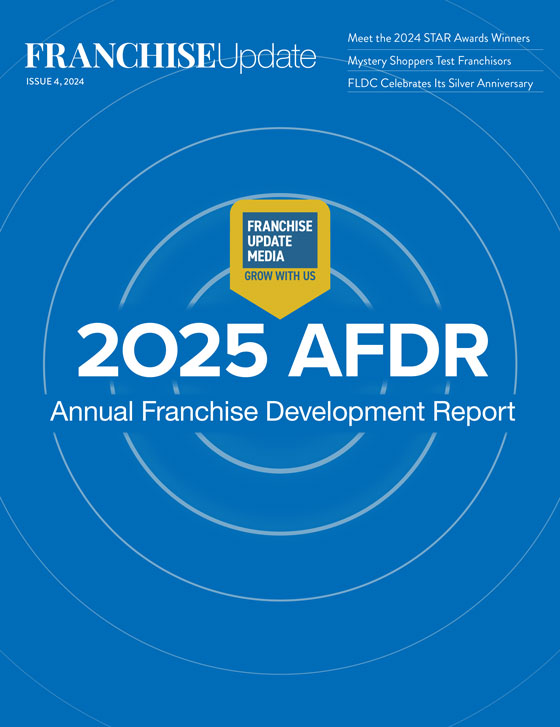A New Pipeline: MUMBO is the word

For a variety of reasons, new recruitment is down for most brands. According to the Annual Franchise Development Report (AFDR), the cost per lead is approaching $300 each. In response, innovative franchisors are targeting existing multi-unit and multi-brand operators. Existing franchisees provide a database to work from, which is better than waiting for good prospects to come to them. But the strategy for being successful with these sophisticated operators is different from dealing with new franchisees.
Multi-unit operators and especially multi-unit, multi-brand operators (MUMBOs) can be crucial for the rapid expansion of your system. These operators possess the infrastructure and experience necessary to scale efficiently and effectively. Brands like Crumbl and 7 Brew Drive-thru Coffee achieved 100 operating units within three years, showing the benefits of aligning with capable franchisees.
A number of successful franchisees aren’t sticking within familiar industries. Many are diversifying, owning operations across food, healthcare, automotive, and retail services. For example, a Dunkin’ franchisee might own coffee shops as well as healthcare centers and schools, reflecting a sophisticated and diversified business model. A practice usually reserved for large investment groups is becoming common among franchisees with large or small portfolios.
The 2023 data on franchise growth underscores how size matters. Brands with more than 100 units average 40 openings annually while the highest performers, such as The Joint and Unleashed Brands, open more than 110 units each year. This trend highlights the importance of speed in capturing market share before competitors emerge. Service brands selling territories may grow faster than those needing physical sites, putting pressure on companies to act swiftly.
Additionally, 4,635 franchise agreements have been signed but the businesses have not yet opened. This backlog creates opportunities for franchisors to develop innovative ways to attract and onboard franchisees capable of sustainable scaling.
Recruiting from among these franchisees requires a different approach than from single-unit or single-brand franchisees. Successful franchisors increasingly shift to direct outreach strategies, using personalized communication to connect with franchisees from other systems. The goal is to understand franchisees’ challenges and provide tailored solutions, using buzzwords like “low inventory” to capture attention. Access to email, phone, and LinkedIn helps to overcome the challenge of connecting with operators who are not always in the store.
Franchise sales teams must adapt their messaging based on franchisee size. A one-size-fits-all approach will not be successful. Smaller operators need different strategies than large-scale owners, who manage multiple brands and often move between industries. Building meaningful relationships and sharing relevant market insights help franchisors position themselves as trusted partners.
These franchisees are looking for more than just a good brand story. Sales teams need to provide much more data about their system and about the market than they would for more traditional franchisees. Franchisors must ensure they have the necessary infrastructure, such as credit reports and validation tools, to support growth objectives. They need to show that they are making technology investments, creating comprehensive marketing programs, and building good vendor partnerships.
The development cycle is also different. Despite impressive growth, many franchise development efforts experience slow starts or delays. Companies like The Joint have seen strong results in later quarters, emphasizing the need for persistence and planning. Franchise development teams are also seeing increased interest from financial firms and private equity, which traditionally had less involvement in franchising. These investors now offer capital directly to franchisees, eliminating intermediaries, accelerating growth, and reducing complexity.
The new franchise development pipeline requires targeting sophisticated operators, leveraging industry insights, and using strategic outreach to build lasting relationships. It’s important to have good data, a thoughtful approach, and support from the system. In the ever-evolving franchising world, those who master these strategies will lead the way toward exponential growth.
As COO of FRANdata, Paul Wilbur is instrumental in building the research and consulting framework at FRANdata. He plays an integral role in the strategic development of FRANdata’s suite of franchise solutions. Nearly a 20-year veteran at the company, he is the franchise business model expert and plays a key role in fostering strategic advisory relationships with some of FRANdata’s biggest clients.
Share this Feature
Recommended Reading:
| ADVERTISE | SPONSORED CONTENT |
FRANCHISE TOPICS
- Multi-Unit Franchising
- Get Started in Franchising
- Franchise Growth
- Franchise Operations
- Open New Units
- Franchise Leadership
- Franchise Marketing
- Technology
- Franchise Law
- Franchise Awards
- Franchise Rankings
- Franchise Trends
- Franchise Development
- Featured Franchise Stories
FEATURED IN

Franchise Update Magazine: Issue 4, 2024
| ADVERTISE | SPONSORED CONTENT |








 The franchise listed above are not related to or endorsed by Franchise Update or Franchise Update Media Group. We are not engaged in, supporting, or endorsing any specific franchise, business opportunity, company or individual. No statement in this site is to be construed as a recommendation. We encourage prospective franchise buyers to perform extensive due diligence when considering a franchise opportunity.
The franchise listed above are not related to or endorsed by Franchise Update or Franchise Update Media Group. We are not engaged in, supporting, or endorsing any specific franchise, business opportunity, company or individual. No statement in this site is to be construed as a recommendation. We encourage prospective franchise buyers to perform extensive due diligence when considering a franchise opportunity.